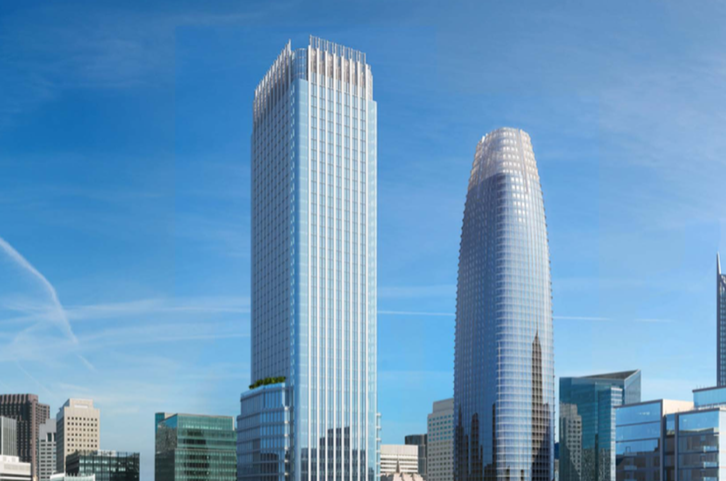
The Chamber of Commerce will apparently be leading the opposition to Prop. E, the measure that would link office growth to housing– and the group’s ballot argument, which just became public, shows the approach the business and development interests will be taking to preserve their right to build more office space than the city’s existing and projected infrastructure can handle.
The argument: Prop. E will mean less affordable housing.

“Prop. E would cut $600 to $900 million in affordable housing fees paid by office space over the next 20 years,” the ballot argument states.
Oh, and if Prop. E passes, “the city stands to lose more than $1 billion in property and gross receipts tax revenue that is used to pay for street cleaning, police officers, navigation centers, Muni service, public toilets, and park maintenance.”
Note the choice of services listed here – this argument is designed to convince progressive voters that Prop. E is bad.
But there are, of course, a few key things missing from that discussion.
Office developers due, indeed, pay affordable housing fees, and if we don’t allow more offices, the city will get less affordable housing money from them.
But the facts are really, really clear: The fees aren’t even close to enough to cover the costs that the new office buildings create. Even with Sup. Matt Haney’s recent move to raise those fees, every office building makes the affordable housing crisis worse.
The buildings the Chamber wants to see constructed would create a demand for $1.8 to $2.7 billion worth of affordable housing; the fees would cover about a third of that. Not building those towers would do more for the housing crisis than building them (at the current fee rate).
And the evidence is also really, really clear that new office buildings create more demand for Muni, police officers, and other city services than they pay for. By far.
The ballot argument is signed by Rodney Fong, president of the Chamber, along with Stephen Adams, the president of the Small Business Commission (whose members are getting priced out by the office-tech boom), Larry Mazzola, Jr., business agent for the plumbers’ union (which has long supported development of pretty much any type because it creates jobs for plumbers, even though the tech boom has made it impossible for many of those workers to live in San Francisco), and Sup. Catherine Stefani.
It will be interesting to see if the Chron, or any other local media, simply report these arguments or analyze them. It will also be interesting to see if the Yimby folks – some of whom have told me in the past the they agree office development is making the housing crisis worse — join the Yes on E campaign.
I don’t think anyone other than the SF Business Times has noticed, but at the last board meeting, Mayor London Breed effectively attacked the new Mental Health SF proposal (which she has endorsed) saying there’s not enough money to pay for it.
She also threatened unspecified cuts to other programs the supes have put forward.
Her remarks came at her monthly appearance before the board.
The decision to fully fund the mental-health program will require “a significant amount of resources,” the mayor said, “and we still don’t know where the money will come from. To add layers and layers and think the money will fall out of the sky is … irresponsible.”
She noted: “I will balance the budget, even if you layer on additional responsibilities.”
This is, of course, one of the richest cities in the history of civilization, and with the mayor’s support, it would be relatively easy to increase taxes on the very wealthy and the biggest businesses to fund not only Mental Health SF but a lot of other programs.
But it sounds like she is pushing for cuts.
Also: This isn’t something I have heard anywhere else, but at the meeting, the mayor suggested that outgoing Sup. Vallie Brown might run in fall 2020 to get her seat back.
In a lengthy thank-you speech for Brown’s community service, the mayor said to Brown: “This may not be your last board meeting – there’s an election next year.”
I wonder if that’s the new play by the Breed team.
Dean Preston, who defeated Brown in November, will be sworn in a the new D5 supe Monday/16, and at his first meeting the next day, he will get to vote (and possibly be a key vote) on legislation that would extend eviction controls to apartments built after 1979.
The measure has five co-sponsors. It it’s close, Preston could be the sixth vote.
The supes will also vote on a proposal to mandate that the city provide an annual report on the fit between job growth (by wages) and housing availability.
And maybe Preston, who ran as a candidate who would “stand up to the mayor,” can change something else that’s been bothering me. Question Time – the right of the supes to ask the mayor policy questions in an open forum – has been largely wasted of late. The right to ask questions rotates, no not all 11 supes get to ask questions every month, which I suppose is fair. But it seems as if most months, nobody asks anything.
In the last board meeting, there were no questions submitted by the supes from districts 5, 6, 7 or 8.
Seriously? With all the issues facing the city, nobody wants to ask the mayor (for example) where she stands on Prop. E, whether she agrees that the jobs-affordable-housing balance is unacceptable and whether she things office developers should pay the full cost of the impacts they have on the city?
Nobody wants to ask about homeless sweeps, or when the body-camera footage of the police shooting in the Mission will be released?
The idea that the supes could have no questions at all for the mayor is beyond belief. Question Time exists for a reason; why is nobody using it?

